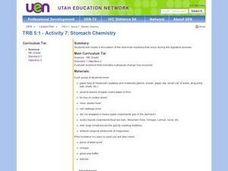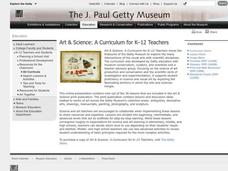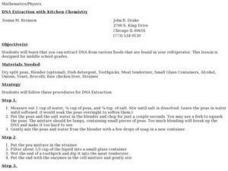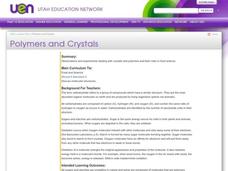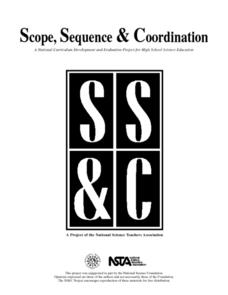Curated OER
Chemical and Physical Changes
Eighth graders investigate different gas behaviors. In this chemistry lesson, 8th graders describe how changing volume and temperature affect gas particles motion. They collect data and make a generalization about these variables'...
Curated OER
A Model of a Scanning Tunneling Microscope
Ninth graders explain how a scanning tunneling microscope works. In this chemistry lesson, 9th graders construct atomic models and simulate how their images appear under the STM. They discuss the limitations of their atomic model.
Curated OER
Chromatography
Students conduct various experiments on chromatography. In this chemistry lesson, students distinguish among the different types of chromatography methods. They explain how the stationary and mobile phase interact with each other.
Curated OER
Straw Chromatography
High schoolers separate food coloring using liquid chromatography. For this chemistry lesson, students explain the effects of different solvents on the rate of separation.
Curated OER
An Alien Periodic Table
Students construct a periodic table based on the physical and chemical properties of elements. In this chemistry lesson, students share their work with the class and explain why they classified the elements that way.
Curated OER
Acidity
Sixth graders describe the physical and chemical properties of acids. In this chemistry lesson, 6th graders test the acidity of different solutions. They identify acids and bases using the pH scale.
Curated OER
Stream Chemistry Monitoring
Students become familiar with real-world gathering of chemical data. The experience how the science is done: the nature of analysis, data collection, interpretation, and presentation. They study a nearby body of water for their experiment.
Virginia Department of Education
Moles Lab Activities
Want my name and number? It's 6.0221415 times 10 to the 23rd, and my name is Avogadro. Providing nine different activities, experiments, and labs, this lesson keeps Avogadro relevant to your class all year long.
Curated OER
Water and Polymers
Students conduct qualitative and quantitative investigations based on the interaction between water and various polymers. They determine the percent moisture contained in various plastics along with a qualitative procedure to determine...
Curated OER
The Study of Molecular Orientation by Linear Dimension Change of Polymeric Films
Students investigate the linear dimension change of heated plastic film and relate the results to processing and service use of the materials. They calculate percent change in dimension as related to anisotropy and molecular reorientation.
Curated OER
Determination of Plasticizer in PVC
Students isolate and determine the amount of plasticizer in polyvinyl chloride. They use Infrared Spectroscopy (IR) or Fourier Transform Infrared Spectroscopy (FTIR) and gravimetric techniques in this experiment.
Curated OER
NEURONS, BRAIN CHEMISTRY, AND NEUROTRANSMISSION
Learners examine the hierarchical organization of the brain, neuron, and synapse; explain the sequence of events involved in communication at the synapse; and that synaptic transmission involves neurotransmitters.
Curated OER
Stomach Chemistry
Fifth graders compare physical and chemical changes. They perform a simulation experiment/activity that replicates what happens in the stomach as food is digested by stomach acids.
Curated OER
The Chemistry of Ceramics
Learners compare the characteristics of a fired porcelain sculpture to the clay used to create it. They discuss the physical and chemical changes that occur in the clay as it is heated and then create their own clay sculpture. This...
Curated OER
Food Color Chemistry
Students investigate plant pigments in fruits and vegetables. In this plant pigments lesson plan, students observe the effects of pH changes on chlorophyll in one demonstration and they observe the effects pH changes on flavonoids in...
Curated OER
Chemistry Lab: Chemical Equilibrium
Students investigate the effects of adding or removing a reactant or a product on chemical equilibrium. In this equilibrium lesson plan, students add or remove ions to solutions to determine the effects on equilibrium. They make...
Curated OER
Chemistry Lab-Heat of Fusion
Students determine the heat of fusion of ice. In this heat of fusion lesson plan, students use a calorimeter to measure the molar heat of fusion of ice. Students determine the heat required to melt one mole of ice using hot water and ice...
Curated OER
Chemistry Lab-Molar Volume of Gas
Students determine the molar volume of hydrogen gas. In this molar volume lesson plan, students find the molar volume of hydrogen produced in a reaction between magnesium and hydrochloric acid. They use a eudiometer to measure the volume...
Curated OER
DNA Extraction with Kitchen Chemistry
Students extract DNA from green peas. In this DNA extraction lesson plan, students use a blender to chop up peas, they mix them with a little soap, they tenderize them and they mix them with alcohol to see the DNA precipitate through the...
Curated OER
The Chemistry of Ceramics
Students make ceramic sculptures to understand how clay works. In this sculpture instructional activity, students learn about porcelain sculptures to understand how heat can turn clay into a hard ceramic surface. They then experiment...
Curated OER
Slime and Intermolecular Attractions
Students explore the strength of intermolecular attractions. They make slime and compare the difference in the physical properties of sheet and powdered polyvinyl alcohol with polyvinyl acetate.
Beyond Benign
Writing the Principles
What is the difference between chemistry and green chemistry? The first lesson of the 24-part green chemistry series introduces scholars to its 12 principles. The tendency is toward nontoxic materials and sustainability.
Curated OER
Polymers and Crystals: Their Role in Food Science
Blend chemistry with cooking in this exploration of polymers, carbohydrates, and food science. Experimenting with gelatin produces concrete examples of the bonding and ploymerization discussed in the lesson. Copious, comprehensive...
Curated OER
Oils and Plastic
Peruse the properties of polymers with your materials engineers, chemistry aces, or emerging ecologists. The inquiries in this resource include puncturing polyethylene plastic bags, dissolving polystyrene cups, creating a polymer ball...
Other popular searches
- Organic Chemistry
- Chemistry Chemical Reactions
- Chemistry Periodic Table
- Chemistry Equations
- Chemistry of Life
- History of Chemistry
- Chemistry Lesson Plans
- Organic Chemistry Projects
- Food Chemistry
- Chemistry Current Events
- Chemistry of Soap
- Water Chemistry














